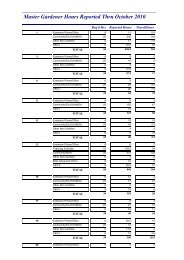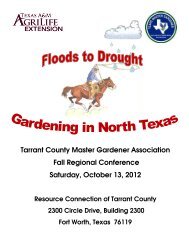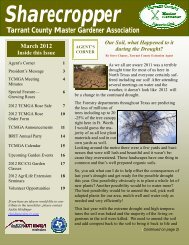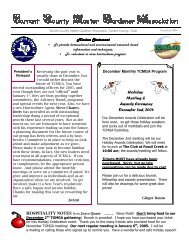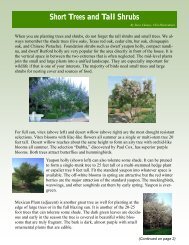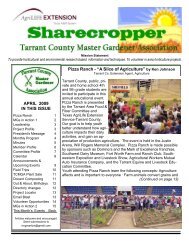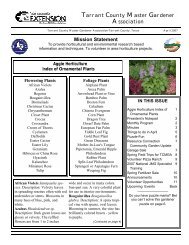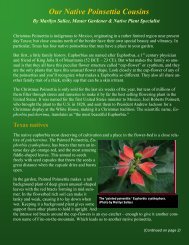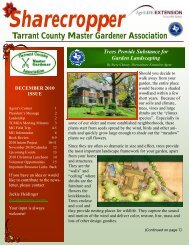Mission Statement - (Tarrant County) Master Gardeners Association
Mission Statement - (Tarrant County) Master Gardeners Association
Mission Statement - (Tarrant County) Master Gardeners Association
Create successful ePaper yourself
Turn your PDF publications into a flip-book with our unique Google optimized e-Paper software.
<strong>Tarrant</strong> <strong>County</strong> <strong>Master</strong> Gardener<br />
<strong>Association</strong><br />
<strong>Tarrant</strong> <strong>County</strong> <strong>Master</strong> Gardener <strong>Association</strong>-<strong>Tarrant</strong> <strong>County</strong>, Texas<br />
March 2007<br />
<strong>Mission</strong> <strong>Statement</strong><br />
To provide horticultural and environmental research based<br />
information and techniques. To volunteer in area horticulture projects.<br />
If you’ve ever grown roses,<br />
the experience may have been<br />
a little thorny — all that pruning,<br />
spraying and constant care<br />
may have negated any pleasure<br />
you received from their<br />
blooms. For several years now,<br />
roses have experienced resurgence<br />
in popularity due to the<br />
marketing of easy-care antique<br />
varieties. Antique roses provide<br />
a great deal of landscape value<br />
without becoming a maintenance<br />
burden. Unlike their<br />
modern hybrid counterparts,<br />
old roses are more disease and<br />
pest resistant, more droughthardy<br />
and certainly more tolerant<br />
of neglect. That’s because<br />
many modern roses are hybridized<br />
simply for their bloom and<br />
color rather than the characteristic<br />
resilience and fortitude<br />
naturally found in old rose species.<br />
In Texas, we are fortunate to<br />
be home to some of the country’s<br />
foremost experts on high<br />
performing roses. The experts<br />
at Texas A&M’s agricultural<br />
program in Dallas have identified<br />
a selection of easy-care<br />
roses that have passed rigorous<br />
field tests and received the<br />
designation of Earth-Kind<br />
roses. Because these plants<br />
are known to require little if any<br />
pesticides, the experts at A&M<br />
consider these plants to be the<br />
finest, most thoroughly tested<br />
and environmentally responsible<br />
plants for use in Texas<br />
landscapes and gardens.<br />
For testing purposes, 117 different<br />
rose varieties were selected<br />
from lists submitted by<br />
experts in various parts of<br />
Texas. These roses were<br />
planted in full sun directly into<br />
heavy, alkaline clay soil with no<br />
additives or amendments.<br />
Throughout the test period, the<br />
rose beds were kept mulched<br />
and watered with drip irrigation<br />
systems, but they were never<br />
fertilized or sprayed. Every two<br />
weeks, the roses were checked<br />
for bloom quantity and quality,<br />
insect damage and disease.<br />
At the end of field-testing,<br />
only 11 varieties flourished.<br />
Many of the “survivors” were<br />
familiar antique roses or their<br />
close relatives. Earth Kind is<br />
an important designation given<br />
(Continued on page 4)<br />
IN THIS ISSUE<br />
EarthKind Roses 1<br />
President’s Notepad 2<br />
Monthly Program 2<br />
Minutes 3<br />
Things To Do In March 5<br />
Old Roses 6<br />
10 Golden Rules of Texas 7<br />
Texas Gardening<br />
Irish Quotes 7<br />
Community Demo Garden 8<br />
Why Did My Plants Die 8<br />
Not So Good Advise 9<br />
Remembrance 9<br />
2007 Awards 10<br />
Announcements 10<br />
Volunteer Opportunities 11<br />
Upcoming Events Back<br />
—————————<br />
Begorrah and Bejabers March 17<br />
is St. Patrick's Day for the patron<br />
saint of Ireland. Who be ye<br />
among us who will not don a<br />
green hat or shirt to patronize the<br />
day? Look for quotes and color<br />
on the event in the newsletter.
Page 2<br />
The Sharecropper<br />
FROM AROUND THE CORNER<br />
President’s Notepad<br />
On a trip to England in 2002 I bought a little<br />
book OLD WIVES' LORE for GARDENERS. It<br />
holds "a sprinkling of superstition mingled with<br />
much good sense" and it is fun to<br />
read. Excerpts:<br />
Sow seed only with the waxing moon; scientist<br />
now know that water, inside even the tiniest<br />
living organism, moves with the tides and<br />
growth happens accordingly. "Sow seed generously,<br />
one for the rook, one for the crow, one to<br />
die and one to grow.” In the 18th century herbalists<br />
warned, never plant the same herb in the<br />
same place in succession, replacing a 'hot' herb<br />
with a 'cool' one (crop rotation) prevents soil<br />
exhaustion. Twist a spiral of tinfoil round the<br />
roots of young cabbage plants to inhibit larvae<br />
of cabbage flies and place tarred or creosoted<br />
string 2 inches from the plants between the<br />
rows. Bury cooking fat (used and cooled is<br />
fine) in the hole before planting a rose for good<br />
blooming. If you must transplant when it is the<br />
wrong time of year, water the plant in with warm<br />
water. If a plant is ailing plant a camomile beside<br />
it, this visiting physician will improve the<br />
health of the ailing plant; move the camomile to<br />
another location when it has done its work so it<br />
won't over take small plants. Hang mothballs in<br />
peach trees to prevent leaf curl. If it moves<br />
slowly enough step on it; if it doesn't, leave it -it<br />
will probably kill something else. A single clove<br />
of garlic clove planted beside a rose will prevent<br />
greenfly and it will not affect the scent of the<br />
rose. All cut flowers will last longer if foxgloves<br />
are added to the arrangement, use foxglove tea<br />
if the use of the flower is not suitable.<br />
Don't knock it if you haven't tried it!!!!!<br />
— Ginger Bason<br />
March 1, 2007 Monthly<br />
TCMGA Program<br />
Having learned about “woody lilies,” next<br />
on our agenda is “lavender and herbs” – topics<br />
many of you have requested. We’re<br />
pleased to say, we’ve found some experts to<br />
be our guest presenters. Mark Whitfield,<br />
Jerry Ware and Jane Dane, owners of Lavender<br />
Ridge Farms near Gainesville, will be<br />
bringing us a “show and tell” day of their<br />
products. Mark will be our featured speaker,<br />
and all three will be on hand to answer questions<br />
and to sell lots of pots of plants! These<br />
three business partners have family roots in<br />
horticulture, and have created this thriving<br />
business out of what was a greatgrandfather’s<br />
strawberry patch. So, bring<br />
some extra $$ and plan on having a really<br />
fun gardener’s day!<br />
9:30 Sign-in, coffee<br />
10:00 “You wanna grow what?”<br />
The art of lavender farming at<br />
Lavender Ridge Farms<br />
11:00 Business meeting<br />
Meet, greet, and eat<br />
12:00 “Herb’n Experience Flower<br />
Presentation” – The cut flower<br />
operation at Lavender Ridge Farms<br />
Happy gardening and we’ll see you March 1!<br />
— Joy Lease<br />
STATE AWARDS SUBMISSIONS<br />
The state awards submissions are completed and<br />
entered for competition.<br />
A BIG THANK YOU to the committee that worked<br />
many hours to prepare the entries: Sue Ellen Schlitzer,<br />
Eleanor Tuck, JoAnn Hahn, Joy Lease, Tammy<br />
Edwards and Ginger Bason. Now we all need to<br />
keep our fingers crossed until April.
The Sharecropper<br />
Page 3<br />
<strong>Tarrant</strong> <strong>County</strong> <strong>Master</strong> Gardener Meeting Minutes February 1, 2007<br />
The meeting was called to order by President<br />
Ginger Bason at the Resource Connection at<br />
11:00 AM.<br />
1. President Bason asked for corrections to the<br />
Minutes from January 4, 2007. Being none,<br />
the minutes were approved as printed in the<br />
newsletter.<br />
2. Treasurer, Tammy Edwards reported for the<br />
period since January 4:<br />
Income: $1,134.00<br />
Expenses: 793.65<br />
Activity balance: 340.35<br />
Checking acct balance: 8,501.75<br />
Savings acct balance: 2,528.97<br />
Investment accts: 15,000.00<br />
Overall Total $26,030.72<br />
3. President Bason explained an error on the<br />
Budget approved at the last meeting. The<br />
amount for Activities Committee was to have<br />
been $700, not $500. The Executive Board<br />
had approved the correction and President<br />
Bason asked the membership to approve.<br />
The membership approved the Budget correction<br />
to $700 for the Activities Committee.<br />
4. Bob Ross presented the Audit Report. All<br />
accounts for the last year are in excellent<br />
condition. Ross commended Rita Hottel for<br />
her excellent record keeping as Treasurer for<br />
the last two years.<br />
5. Announcements:<br />
• Lost name badge: Joyce Colegrove<br />
• Susan Miller, Project Chair for Trial Garden<br />
at FWBG planning meeting for 2-13-<br />
07 at 11AM, Camellia Room, FWBG.<br />
• Pat Higgins encouraged members to sign<br />
up to bring food for next month.<br />
• Jim Nelson, Project Chair for the Community<br />
Garden at the Resource Connection,<br />
introduced the four Texas Christian University<br />
students present. These students<br />
are in Nutrition or Nursing at TCU. They<br />
have worked in the garden and helped<br />
with its development through the Center<br />
for Civic Literacy at TCU.<br />
• Caladium bulbs may be ordered and prepaid<br />
today for delivery at the April meeting.<br />
See Jim Nelson.<br />
• Mary Margaret Halleck has Victory Boxes<br />
to give out.<br />
• President Bason encouraged members to<br />
attend the state <strong>Master</strong> Gardener Conference<br />
in Kerrville, TX in April where Felder<br />
Rushing will be presenting. Door prizes<br />
included gift certificates to garden centers<br />
and spineless cacti, the cacti were courtesy<br />
of our speaker, Peter Schaar.<br />
6. The meeting was adjourned at 11:22 AM.<br />
Naturalists<br />
Texas <strong>Master</strong> Naturalists- Cross Timbers Chapter<br />
will have a class beginning April 3, 2007.<br />
Applications available from gbason@ hotmail or<br />
Steve Chaney s-chaney@tamu.edu 817-884-<br />
1944<br />
— Jim Nelson<br />
MG Conference in Kerrville<br />
Don't forget the 2007 Texas <strong>Master</strong> Gardener<br />
Conference in Kerrville April 12 - 14. If you have<br />
not signed up, you can still do so. You have to<br />
print the form and mail it in this year.<br />
Get all of the details at www.hillcountrymaster<br />
gardeners.org.<br />
—Ginger
Page 4<br />
The Sharecropper<br />
LEADERSHIP<br />
President—Ginger Bason<br />
gbason@hotmail.com<br />
1 st VPresident—Joy Lease<br />
jlease@prodigy.net<br />
2 nd VPresident—Jim Nelson<br />
nelsonj2@swbell.net<br />
Secretary—Joyce Quam<br />
dquam5@juno.com<br />
Treasurer—Tammy Edwards<br />
tammy.edwards@gmail.com<br />
Sharecropper—Derald Freeman<br />
grreatideas@sbcglobal.net<br />
Submissions to Sharecropper—<br />
tammy.edwards@gmail.com<br />
Activities—Susan Stanek<br />
slstanek@charter.net<br />
Birthdays/Sunshine—LaVonne<br />
Nowlin lavonnen@sbcglobal.net<br />
Directory changes and<br />
Membership—Carl Trehus<br />
c.trehus@gte.net<br />
Steve Chaney<br />
s-chaney@tamu.edu<br />
TCMGA Web site<br />
http://www.tcmga.org<br />
817-884-1944<br />
(Continued from page 1)<br />
to select roses by the Texas A&M University Agriculture program<br />
that was headed by Steven W. George, Ph. D., Professor<br />
and Extension Landscape Specialist, Texas A&M University.<br />
In the five-year testing program these roses were never fertilized,<br />
never sprayed, never pruned other than to remove dead<br />
wood, and never watered after the first year.<br />
Earth Kind Roses are among the most thoroughly tested,<br />
and environmentally responsible<br />
plants for the use in Texas landscapes.<br />
These roses do very well<br />
in almost any soil type, from the<br />
well-drained acid sands of East<br />
Texas to the poorly aerated,<br />
highly alkaline clays of Central<br />
and Southwest Texas. Their tolerance<br />
to pests is so great that they<br />
rarely require the use of chemical<br />
pesticides.<br />
Only a few roses have received<br />
the Earth Kind badge of honor. There were originally 11 roses<br />
selected as the best from the 117 being tested. The honor roll<br />
has now been increased to a total of 13.<br />
The honor list consists of Belinda's Dream, Caldwell Pink,<br />
Climbing Pinkie, Duchesse de Brabant, Else Poulsen, Katy<br />
Road Pink (Carefree Beauty), Knockout, Marie Daly, Mutabilis,<br />
Perle d'Or, Sea Foam, Spice, and The Fairy.<br />
We have Belinda's Dream, Cecile Brunner, Duchesse de<br />
Brabant, Don Juan, Climbing Cecile Brunner, Marchessa<br />
Boccella, Ice Berg, Queen Elizabeth, Souvenir de la Malmaison,<br />
Lady Banksia, Mister Lincoln, Cascade, and a total of 32<br />
roses in our landscape. Nearly all of these came from the list of<br />
117. They never need treatment for fungal, bacterial or insect<br />
problems.<br />
The ones which put on the grandest show are the Belinda’s<br />
Dream, Queen Elizabeth, Don Juan, and Mr. Lincoln. The<br />
dainty blossom and faint mesmerizing scent of the Cecile Brunner<br />
and Souvenir de la Malmaison cannot be resisted. The<br />
many hundreds of blooms on the Lady Banksia that appear<br />
only one time per season are unforgettable.<br />
A FINAL THOUGHT IN CLOSING: You can complain that<br />
roses have thorns, or you can be thankful that thorny bushes<br />
have roses.<br />
—the editor
The Sharecropper Page 5<br />
THINGS TO DO IN MARCH<br />
March is a transition month, one foot<br />
in winter, the other in spring. The weather is<br />
warming and the first of the spring bulbs are<br />
starting to bloom. March is a prime gardening<br />
month here in Texas. The weather is often a<br />
mixed bag - from gray and rainy days to balmy<br />
afternoons filled with mellow sunshine. The<br />
night temperatures are in the 50-60's and the<br />
days are in the 70's. This is the start of one of<br />
the busiest planting times of the year as you<br />
can plant almost anything from seeds to citrus.<br />
Now is the time to plant trees, shrubs, vines,<br />
summer annuals, some cool-season and most<br />
warm season vegetables, and herbaceous perennials.<br />
SCALPING: Control winter weeds by starting<br />
your regular mowing regime. Get your mower<br />
blade sharpened now if you haven't done it yet.<br />
If you decide to scalp your lawn, wait until all<br />
danger of freezing is over. After mid-March.<br />
PREEMERGENT: If you missed applying a<br />
preemergent weed preventer in February and<br />
you had a summer weed problem in your lawn<br />
last year (such as grass burs), then go ahead<br />
and make an application now and then repeat it<br />
90 days later.<br />
MAINTENANCE: Dig and divide summer<br />
and fall blooming perennials this month. Cannas,<br />
coneflowers, fall asters, mums,<br />
and perennial salvias can be invigorated<br />
and increased for expanding<br />
your beds. This is a<br />
good time to remove those bird<br />
nests that are in disrepair or unsightly<br />
from last year.<br />
LAWN FERTILIZING: Wait to fertilize your<br />
St. Augustine or Bermuda lawn until April, or after<br />
you have mowed actively growing grass (not<br />
weeds) twice. If you had your soil tested, apply<br />
lime to increase pH (alkalinity) or sulfur to lower<br />
pH (acidity). Fertilize grass late this month with<br />
a 24-0-0, 3-1-2 or 4-1-2 ratio fertilizer, (N, P,<br />
and K) high in nitrogen.<br />
PLANT FERTILIZING:<br />
Begin fertilizing roses every 4 to 6 weeks<br />
from now until September. Fertilizer ratio of 10-<br />
10-10 should be broadcast over the entire garden.<br />
Fertilize the garden 2-3 times during the<br />
growing season.<br />
PRUNING: You can prune evergreen and<br />
summer flowering trees and shrubs this month.<br />
But, prune spring flowering shrubs (forsythia,<br />
quince, azaleas, Spirea, etc) only after they finish<br />
blooming, if needed. Evergreens like podocarpus,<br />
holly, boxwood, ligustrum, juniper and<br />
wax myrtle can be pruned any time. Never<br />
prune plants during a growth flush (leafing out).<br />
Shear back Asiatic jasmine to encourage new<br />
growth from the base.<br />
EVENTS:<br />
March 11 is Daylight Savings Time (DST)<br />
when we will move their clocks ahead one<br />
hour. From 1986 to 2006 this has been the first<br />
Sunday in April to the last Sunday in October,<br />
but starting in 2007, it will be observed from the<br />
second Sunday in March to the first Sunday in<br />
November. To remember the setting on the<br />
clocks is to think "Spring forward, fall back".<br />
March 15 is the "Ides of March", a term that<br />
has forever imbued that date from the earliest<br />
Roman calendar as the soothsayer's warning to<br />
Julius Caesar.<br />
March 17 is St. Patrick's<br />
Day for the patron saint of<br />
Ireland who was born in<br />
Wales about AD 385.<br />
March 20 marks the beginning<br />
of spring, the changing<br />
of seasons. It is significant<br />
for astronomical reasons<br />
because the Sun will<br />
cross directly over the<br />
Earth's equator, known as the vernal equinox<br />
in the Northern Hemisphere.<br />
—from the Editor
Page 6<br />
The Sharecropper<br />
OLD ROSES<br />
Dr. Bill Welch<br />
Professor and Extension Landscape Specialist, Department of<br />
Horticultural Sciences and Texas Agricultural Extension Service<br />
Foreshadowed by modern<br />
hybrids, old roses have been<br />
overlooked in this century;<br />
but now there is a renaissance<br />
afoot to restore the<br />
older varieties to their rightful<br />
place in the garden. These<br />
plants are incredible not only<br />
for their survival but for their garden virtues.<br />
They climb, ramble, trail and form bushes<br />
large and small. They bloom steadily for several<br />
seasons or bloom overwhelmingly for one.<br />
They can be used as the background for a bed,<br />
or form its backbone, or be massed for color in<br />
the foreground. They will even settle happily<br />
into containers for those who have no garden<br />
space at all. Their colors tend to be lush and<br />
muted rather than hard and bright, enabling<br />
them to blend well, not only with each other,<br />
but with everything else in a garden setting.<br />
Their historic interest, color fragrance, and<br />
form should make old roses as indispensable<br />
to today's gardens as they have been for centuries.<br />
Many gardeners will attest, the best thing<br />
about old roses is that they provide all these<br />
landscape values without becoming a maintenance<br />
burden. Unlike modern roses, which<br />
grow poorly without many hours of devoted attention,<br />
most old roses will give today's busy<br />
homeowner an appreciated rest from much of<br />
the heavy fertilizing, spraying, and nurturing demanded<br />
by their younger cousins.<br />
PREPARING A ROSE BED:<br />
Old Garden Roses are hardy even in poor<br />
conditions, but they will be at their lovely best if<br />
planted in a favorable situation with rich, well<br />
drained soil. The best place to locate a rose<br />
bed is in an open area that receives at least six<br />
hours of direct sun daily (preferably in the<br />
morning) and allows good healthy air movement.<br />
MULCHING AND WATERING:<br />
A several inch thick layer of mulch applied 2<br />
or 3 times a year means fewer weeds, less water<br />
stress, less heat stress, richer soil and<br />
healthier plants. We use a broken down pine<br />
bark on our beds, but pine needles, leaf mulch<br />
or any weed free material will do the job. Your<br />
plants will look much better in your garden if<br />
they get a deep soaking every 7 to 10 days.<br />
FEEDING:<br />
Most commercial rose foods and organic fertilizers<br />
are fine and give good results. The important<br />
thing about any fertilizer application is<br />
that lots of water will be wanted; both to dissolve<br />
the fertilizer into a form the rose can use<br />
and to clean any residue off the bush. For best<br />
results feed at 4 to 6 week intervals until 6<br />
weeks before the earliest frost date.<br />
PRUNING:<br />
Old roses don't require the stringent and<br />
careful pruning that is needed by many modern<br />
sorts - in fact they can sulk and refuse to bloom<br />
if pruned too hard. Just a light touch of sharp<br />
pruning shears is all that is needed for them to<br />
respond beautifully. A good rule of thumb is to<br />
clip back no more than 1/3 of the bush, encouraging<br />
full foliage and heavy bloom without destroying<br />
the vigor and natural attractive form of<br />
the plant.<br />
Ever-blooming varieties can be lightly<br />
trimmed or "tip-pruned" several times a year, as<br />
they flower on new growth. Roses that bloom<br />
but once are best pruned after they have<br />
bloomed.<br />
When pruning bushes, remove any dead<br />
canes or twigs, any unbalanced growth and a<br />
few inches overall. For climbing roses, only<br />
dead or unwanted canes need to be removed.
The Sharecropper Page 7<br />
10 Golden Rules of Texas Gardening<br />
Steve Chaney<br />
1. If you’re not having ‘Fun’ in your garden,<br />
then why do it?<br />
2. Choose plants that are native or adapted<br />
to your area. How: Borrow with your<br />
eyes!<br />
3. Garden organically whenever possible.<br />
4. Plant only what you can comfortably take<br />
care of!<br />
5. Be a patient Gardener – allow room for<br />
plants to grow into their natural, mature<br />
shape.<br />
6. Feed the ‘Soil’ not the plants, for a longterm<br />
healthy garden.<br />
7. Choose planting site carefully and include<br />
plants that grow well there.<br />
8. Expect to give special attention to plants<br />
that you grow in areas they are not suited<br />
for – Azaleas, Rhododendrons, etc.<br />
9. Be prepared – Have a plan before Digging!<br />
Remember – ‘Kittens grow up to be<br />
Cats’. ‘Tiny little seedlings grow up to be<br />
Giant Oaks’.<br />
10. Share what you know, What you love,<br />
What you have.<br />
- Become a <strong>Master</strong> Gardener<br />
- Become a <strong>Master</strong> Naturalist<br />
- Become a <strong>Master</strong> Volunteer<br />
Logo Clothing and Tool Sale<br />
<strong>Master</strong> Gardener items such as logo clothing,<br />
caps, bags, tools, etc. will be available for purchase<br />
at the March 1 monthly meeting.<br />
Orders will be accepted at that time for pickup at<br />
the April 5 monthly meeting. We have a new supplier<br />
this year. Hopefully this will eliminate some<br />
of the confusion in orders that we experienced<br />
last year.<br />
— Jim Nelson<br />
IRISH QUOTES<br />
This month is St. Patrick’s Day. The Irish have<br />
always been recognized as having the gift of<br />
gab, so it should come as no surprise that a relatively<br />
small country has produced so many great<br />
writers, orators, and just plain ordinary folk with a<br />
lot to say. Among these are Oscar Wilde, W. B.<br />
Yeates, James Stephens, George Bernard<br />
Shaw, Charles Stewart Parnell, Samuel Beckett,<br />
Jonathan Swift, James Joyce, Edmund Burke,<br />
and Sean O. Casey.<br />
Many notable quotes came from Ireland.<br />
• A good beginning is half the work.<br />
• You'll never plow a field by turning it over in<br />
your mind.<br />
• It's no use boiling your cabbage twice.<br />
• Every dog is brave on his own doorstep.<br />
• Do not show your teeth until you can bite.<br />
• Put silk on a goat and it is still a goat.<br />
• An old broom knows the dirty corners best.<br />
• It takes time to build castles.<br />
• There is luck in sharing a thing.<br />
• Beauty will not make the pot<br />
boil.<br />
• Better good manners than<br />
good looks.<br />
• One man's meat is another<br />
man's poison.<br />
• If the cap doesn't fit, don't wear it.<br />
• It is better to be lucky than rich.<br />
• A kind word never broke anyone's mouth.<br />
• You never miss the water till the well has run<br />
dry.<br />
• If you lie down with dogs, you'll rise with fleas.<br />
• No one is ever poor who has the sight of his<br />
eyes and the use of his feet.<br />
• When your hand is in the dog's mouth, withdraw<br />
it gently.<br />
—the editor
Page 8<br />
The Sharecropper<br />
Community Demonstration<br />
Garden Update<br />
The work has been progressing so well at the<br />
garden that planting is ready to start. Now all 16<br />
planting beds in the general planting area are<br />
complete. And, here is where you come in. Everyone’s<br />
help is needed with donations of plant<br />
material, soil, compost, manure, mulch and other<br />
miscellaneous items. If you are dividing plants,<br />
bring them; if you have seeds, bring them; when<br />
you dig and divide your bulbs, set aside several<br />
for the garden. If you have extra bags of planting<br />
material/soil amendments, donate them and be<br />
sure and bring your grass clippings and leaves<br />
for the compost bins. If you can’t get to the garden<br />
on Tuesday or Friday mornings, bring the<br />
items to the monthly meeting and give them to<br />
Jim Nelson.<br />
Other recent improvements include the rose<br />
berm thoroughly tilled with 4-6 inches of horse<br />
manure; serpentine plant beds along two sides of<br />
the barn completed and ready for planting; half of<br />
the hollies have been planted; and a three tier<br />
prototype of the enabled gardening plant bed has<br />
been constructed.<br />
The partnership with the TCU Center for Civic<br />
Literacy is in motion with 23 TCU seniors from<br />
the nursing and nutrition programs working on<br />
Mondays and Thursdays at the garden. The mission<br />
of the TCU Center for Civic Literacy is to<br />
educate individuals to be informed, responsible<br />
and ethical participants in the civic life of their<br />
communities. The students are working alongside<br />
<strong>Master</strong> <strong>Gardeners</strong>. They have two general<br />
assignments under the 2007 grant for $5,000<br />
namely: (1) to support development of the garden<br />
and garden activity startup in support of interested<br />
community clientele, and (2) to define<br />
techniques and/or material to promote the garden<br />
to potential clients and to sustaining sponsors.<br />
All <strong>Master</strong> <strong>Gardeners</strong> are invited to come out<br />
on Tuesday and Friday mornings to become involved<br />
in this worthwhile project.<br />
—Judy Butler<br />
Why Did My Plants Die?<br />
Anonymous<br />
You walked too close. You trod on it. You<br />
dropped a piece of sod on it.<br />
You hoed it down. You weeded it. You planted it<br />
the wrong way up.<br />
You grew it in a yogurt cup, but you forgot to<br />
make a hole for it;<br />
The soggy compost took its toll. September<br />
storm, November drought.<br />
It heaved in March, the roots popped out.<br />
You watered it with an herbicide.<br />
You scattered bone meal far and wide, attracting<br />
local omnivores, who ate your plant and<br />
stayed for more.<br />
You left it baking in the sun, While you departed<br />
at a run, to find a spade, perhaps a trowel.<br />
Meanwhile the plant threw in the towel.<br />
You planted it with the crown too high; The soil<br />
washed off, that explains why.<br />
Too high pH. It hated lime, Alas it needs a gentler<br />
clime.<br />
You left the root ball wrapped in plastic. You<br />
broke the roots, They’re not elastic.<br />
You walked too close, You trod on it. You<br />
dropped a piece of sod on it.<br />
You splashed the plant with mower oil, You<br />
should do something to your soil.<br />
Too rich, Too poor. Such wretched filth. Your soil<br />
is clay, your soil is filth.<br />
Your plant was eaten by a slug. The growing<br />
point contained a bug.<br />
These aphids are controlled by ants, who milk<br />
the juice, it kills the plants.<br />
In early spring your gardens mud, You walked<br />
around! That’s not much good.<br />
With heat and light you hurried it. You worried it.<br />
You buried it.<br />
The poor plant missed the mountain air: No heat,<br />
no summer mugs up there.<br />
You overfed it 10-10-10. Forgot to water it again.<br />
You hit it sharply with a hose.<br />
You used a can without a rose. Perhaps you<br />
sprinkled from above.<br />
(Continued on page 9)
The Sharecropper Page 9<br />
(Continued from page 8)<br />
You should have talked to it with love. The<br />
nursery mailed it without roots.<br />
You killed it with those gardening boots.<br />
Phil the Groundhog didn’t see his shadow this<br />
year, so we are due an early spring. In place of<br />
a catchy article, I wanted to share this with you<br />
that describes a lot of the problems we as gardeners<br />
face each and every year.<br />
Enjoy the spring and let’s have a great year.<br />
—Steve Chaney<br />
REMEMBERANCE<br />
Susann Draper (2001), died December 28,<br />
2006. She had a great passion for her volunteer<br />
work with the <strong>Master</strong> Gardener <strong>Association</strong> at the<br />
Botanic Garden. The Children’s garden was very<br />
important to her, as were the Test Garden, and<br />
the Perennial Garden.<br />
Susann won the "Top of the Trees" award at the<br />
Botanic Gardens for being one of the top volunteers<br />
for 3 years running which was over 100<br />
hours. She was a volunteer that could always be<br />
counted on and she will be missed.<br />
Not So-Good Advice<br />
1. Plant it. If it was meant to be there it will<br />
grow.<br />
2. It grew in the church yard without any water.<br />
3. The nursery tag said "full sun" so it should<br />
have done okay.<br />
4. I heard that many times before but never<br />
believed it. (Why Not?)<br />
5. Pull on it. If its a weed it won't come up.<br />
(Now what do you do with the perfectly<br />
good plant in your hand?)<br />
6. The nursery tag said it won't grow over 4<br />
feet tall so buy it!<br />
7. It says on their web site that I should fertilize<br />
my lawn five times a year instead of<br />
three so I am going to follow their rules.<br />
They should know. (How do you think they<br />
make a profit?)<br />
8. The almanac says we are going to have a<br />
rainy summer so I'm waiting to install the<br />
sprinkler system this year.<br />
9. Plant the green side up.<br />
10.If a little bit is good, a lot is better.<br />
11.<br />
—the editor<br />
The books selected in Susann's honor are:<br />
The Complete Book of Herbs, an ultimate guide<br />
to herbs and their uses as well as the botanical<br />
A-Z encyclopedia of herbs, details over 150 common<br />
and lesser-known varieties of plants. It provides<br />
growing tips as well as essential information<br />
on their medicinal, culinary, and scented<br />
properties.<br />
The Plant Selector gives guidance on color<br />
matching and mixing, types of plants (from<br />
ground cover to climbers) and where they should<br />
be planted. The book enables the design of<br />
beds and borders from scratch or to fill in difficult<br />
gaps and spaces in existing garden plans with<br />
the confidence that the results will be vibrant,<br />
color-coordinated and graduated in height.<br />
Submitted by LaVonne Nowlin
Page 10<br />
The Sharecropper<br />
Garden, Lawn, & Home Expo<br />
The Fannin <strong>County</strong> <strong>Master</strong> <strong>Gardeners</strong> are having<br />
their 3rd annual Garden, Lawn, & Home Expo<br />
on Saturday, March 31, 2007, from 9:00 am to<br />
4:00 pm at the Multi-Purpose Complex located at<br />
FM 87 and Hwy 56 West of Bonham.<br />
Speakers will be Jessie Gunn Stephens, Dottie<br />
Woodson, Dr. Kevin Ong, Dr. Steve George, and<br />
Mark Chamblee of Chamblee Rose Nursery.<br />
For advanced tickets, call<br />
Fannin <strong>County</strong> Extension office<br />
903-583-7453<br />
Submitted by Connie Aplin, <strong>Master</strong> Gardener<br />
and Extension, Secretary, Fannin <strong>County</strong><br />
(These seminars could count as CEU's for you<br />
if you should attend. Steve Chaney)<br />
2007 Awards<br />
We need your ideas!<br />
The awards committee will have a box at each<br />
monthly meeting for you to submit your ideas<br />
about the type of awards that should be given<br />
out (e.g. master gardener of the year, educator<br />
of the year, extra mile award) and the<br />
names of <strong>Master</strong> <strong>Gardeners</strong> that deserve to<br />
be recognized for those awards. There is no<br />
limit to how many people you may suggest,<br />
but give a brief reason why your candidate<br />
should be considered. When thinking about<br />
awards, list the criteria for theses awards.<br />
If you prefer, this may be sent to me at my e-<br />
mail address or my home address, and you do<br />
not have to sign your name. These awards<br />
are given out by the membership, not by the<br />
board.<br />
Think outside the box!<br />
—JoAnn Hahn Awards Chairman<br />
Birthdays for this month<br />
3-1 Susan Haynes, Debbie Mims<br />
Betsy Norman, and Linda Fogle<br />
3-4 Robbie Crawford and Billy Joe Gabriel<br />
3-5 Jody Morris and Charlotte Krystinik<br />
3-6 Moria Brunken<br />
3-10 Susan Miller and Kay Lewis<br />
3-11 Samantha Hosti<br />
3-12 Bob Ross and Emily Ward<br />
3-13 Pat Oliver<br />
3-15 Millie Ruby<br />
3-16 Peg Surber;<br />
3-17 Judy Melton and Susanne Mills<br />
3-26 Sharon Nice and Marshall Harris<br />
3-28 Jo Ann Perdue<br />
3-29 Susan Stanek and Carol Lally<br />
3-30 Dawn Hancock and Bernice<br />
Ramsbottom<br />
3-31 Jo Poppelreiter and Kim Freeman<br />
—by LaVonne Nowlin<br />
The Raffle Committee<br />
..has had a request for some "Manly Raffle<br />
Items", so round up those boots and spurs and<br />
carry them on down to our March Meeting. We<br />
have two new members on our committee Sandra<br />
Johnson and Dottie Bucy. We are delighted<br />
to have their help and their input. See<br />
you in March...Barb, Dottie, Joyce and Sandy.<br />
Vendor Tables<br />
Vendor Tables will be available at the <strong>Master</strong><br />
Gardener meeting on March 1st for <strong>Master</strong><br />
<strong>Gardeners</strong> or affiliates who want to offer their<br />
products for sale. The price per table is $15. If<br />
you want to reserve a table call or e-mail Jim<br />
Nelson<br />
— Jim Nelson
The Sharecropper Page 11<br />
Volunteer Opportunities for TCMGA<br />
Project Code & Name Work Days/Times Project Manager Phone<br />
301 BRIT Activities Call chairman Kay Yount 817-292-7690<br />
311 Perennial Garden 8:30 a.m., Weds. Patsy Johnson 817-292-5358<br />
312 Trial Garden Maintenance 1 st , 3 rd Tues, 8:30 a.m.. Susan Miller 817-261-1420<br />
312 Trial Garden Data 2 nd & 4 th Tues. Susan Miller 817-261-1420<br />
313 BG Cottage Garden Call chairman Diane Clark 817-249-2760<br />
321 Thistle Hill 1 st , 3 rd Weds. 9:30 a.m. Emily Ward 817-281-5925<br />
322 Union Gospel <strong>Mission</strong> Every Mon. 10 a.m. Gay Larson 817-441-6560<br />
323 Grapevine Botanic Garden Call coordinator Shari Stanfield 817-685-9990<br />
324 Mansfield Main St. Project 3 rd Wed. 9 a.m. Donna Turner 817-473-8253<br />
326 Teen Challenge Every Wed. 9 a.m. Debbie Bollinger 817-498-1508<br />
327 Community Garden Tues & Fri 8-11 am Jim Nelson 817-688-2842<br />
401 Composting Demo 1 st Sat. Don Graves 817-465-1667<br />
2 nd Sat. Charlie Shiner 817-548-7117<br />
402 FW Nature Center Call chairman Leeann Rosenthal 817-237-7180<br />
403 FW Library at Hulen St. 4 th Thurs, 8:30 a.m. Evaline Woodrey 817-295-4683<br />
404 SW Sub-Courthouse 2 nd Sat, last Wed. Gailon Hardin 817-457-4703<br />
405 Liberty Garden Call chairman Wendi Carlucci 817-488-5640<br />
2nd Tues, 8-11 a.m.<br />
406 Veterans Park-Wildscape Mar 3, 9-12 Mary McCoy 817-561-0598<br />
Tues 9-12 p.m.<br />
408 TX Smartscape Demo Call chairman Michael Warren 817-531-6765<br />
School Gardens<br />
601 Alice Carlson Mon/Thurs 8:30 a.m. Sharon Chastain 817-926-2575<br />
602 Branson Call chairman Glenda Page 817-447-8348<br />
604 Fitzgerald Wed. 3:15 p.m. Leeann Rosenthal 817-237-7180<br />
605 Oakhurst Call chairman Margaret Hare 817-763-5054<br />
611 Children’s Garden Call chairman Dolores Geisel 817-446-4536
<strong>Tarrant</strong> <strong>County</strong> <strong>Master</strong> Gardener <strong>Association</strong><br />
200 Taylor St., Suite 500<br />
Fort Worth, Texas 76102-7308<br />
Calendar of Upcoming Events<br />
3/16 - 3/18 Will Rogers H&G Show<br />
3/24 Yardsmart Seminar @ FWBG<br />
4/3 Spring <strong>Master</strong> Naturalist Class begins<br />
4/12 - 4/14 MG State Conference in Kerrville<br />
04/26 Metro Maples and Stegall's Nursery<br />
4/27 - 4/28 Rose Adventure in Tyler<br />
05/22 Lavender Ridge Farm and Bailey Blueberry Patch<br />
5/2 -5/4 International MG Conference in Little Rock, Ark.<br />
5/7 - 5/9 Waterama<br />
5/8 - 5/10 Pizza Ranch<br />
Late June (date TBA) Arlington Garden Tour<br />
Steve Chaney—For up-to-the-minute TCMGA news visit: www.tcmga.org<br />
More state news: www.texasmastergardeners.com



